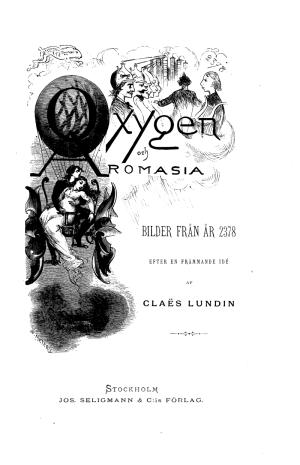Oxygen and Aromasiaby Claës Lundintranslated by Bertil Falk |
Table of Contents
Chapter 11 appeared in issue 265. Part 2, Part 3 Part 4, Part 5 appear in this issue. |
|
Chapter 12: New Joint Stock Companies
Part 1: Fine Dining |
Inspired by the German philosopher and science fiction writer Kurd Lasswitz’ novel Bilder aus der Zukunft (“Pictures from the Future”), the Swedish journalist Claës Lundin (1825-1908) created the novel Oxygen och Aromasia, “pictures from the year 2378” — a date exactly five centuries in the novel’s future. Bewildering Stories is pleased to bring you this classic of early modern science fiction in Bertil Falk’s translation.

”This will create a total upheaval when it comes to public and private economy,” said one of the guests of the banquet.
Quite contrary to custom, bank director Giro was entertaining guests with a dinner at his home, one of the palaces of Majorna.
“Our bank is the one that has developed all these food factories,” said the director, “and I’m convinced that we have thereby done humanity a great favor.”
“Oh yes, very great,” was the general exclamation of the guests, most of them part owners of the bank.
“Henceforth, you don’t have to be ruined by having breakfast at home, and you don’t have to resort to power pills.”
“What an upheaval in family life!”
The guests sat in the bank director’s new dining-hall, specially built in the basement of the palace in order to test the invention. It was equipped with all the splendor customary to bankers of centuries before, but only one of the directors of the perhaps foremost of the many banking institutions in Gothenburg’s Majorna district had, more than anyone else, the capacity to develop it.
On the table stood some unusually shaped vessels of precious metals, and beside them were neat bowls with simple primary products for the dinner meal. There was nothing bloodstained: no raw meat, nor any of the other substances that were still unavoidable in kitchen laboratories even though science and art had taken over the art of cooking.
All the former parts of cooking were done in advance in the factories, but not even there was anyone disgusted by constituent parts, for all foodstuffs manufactured in the factories were totally artificial. There was nothing from the animal or the vegetable worlds in them.
“This is what we have striven for, for so long,” Giro said, “but not until now have we succeeded. It’s true, though; much still has to be perfected in several respects.”
“But what stuff is in this food?” one of the guests asked.
“For the time being, it is, of course, a secret of the inventor,” replied the bank manager, “but you can be convinced that there are no traces of what we used to call articles of food. Everything is artificial!”
”That’s splendid, that’s superb, brilliant!” could be heard from the guests, while the hostess mixed the contents of the different bowls with a platinum spoon in everyone’s presence. She distributed the stuff on the many metal vessels, and by just pressing her little finger, she induced a galvanic current into them. Within a few moments it performed the cooking and roasting, as one would have said in the past, to perfection.
The courses prepared in this manner supplied a greater variety than what even the most skillful kitchen engineers had so far been able to bring about through ordinary means.
“But what, exactly, does this dish taste like?” asked one guest, who sat thoughtfully while permitting his tongue to spin around against the roof of his mouth.
“That’s exactly what’s impossible to say,” the host explained, “and that’s terrifically pleasing. For every one of these dishes, one experiences a certain flavor and endless mix of agreeable ingredients, something never before suspected.”
“Brilliant!” was once more heard from the guests.
“But what will now happen to the big inns?”
“They’ll go down the drain, of course. That’s the way of the world. The new must push aside the old. What was considered excellent yesterday loses its value today, and tomorrow it’s totally unusable. If you have any inn stocks, sell them straight away. I think that some stocks still are available in the new provision factories.”
Those, who didn’t have any such stocks, rushed and tried to buy some of them and through their host’s kind courtesy they obtained them. Satisfaction shone in everybody’s eyes.
People rose from the table almost lighter, they thought, than they had been at the beginning of the meal.
“It’s also an advantage,” the host remarked, “that the new factories part with a grand meal at a lower price than the smallest light meal up to now, and nevertheless you won’t experience any unpleasant heaviness in your lower abdomen, as was often the case before. When the meal is finished, you don’t even know that you’ve eaten. Only a pleasant memory remains and brightens the rest of the day. The old feasts in private houses can once more come back into fashion, but how different, and with how much more delightful consequences compared to the old days!”
“Brilliant!” the guests exclaimed once more. We live in the age of progress.”
* * *
Proceed to Chapter 12, part 2...
Story by Claës Lundin
Translation copyright © 2007 by Bertil Falk
